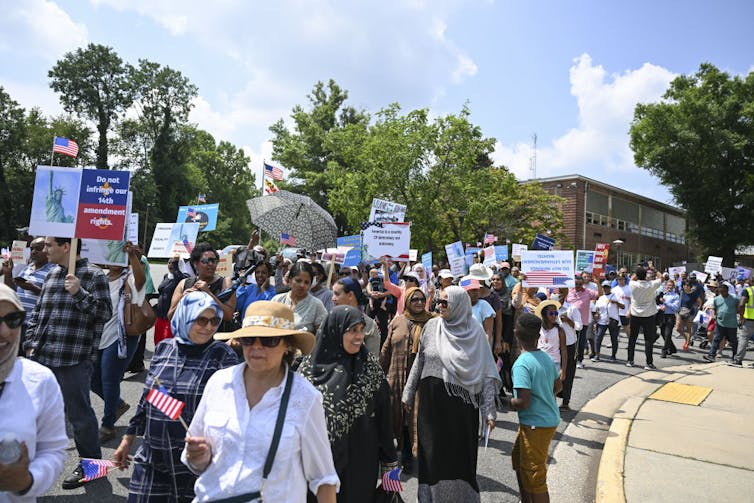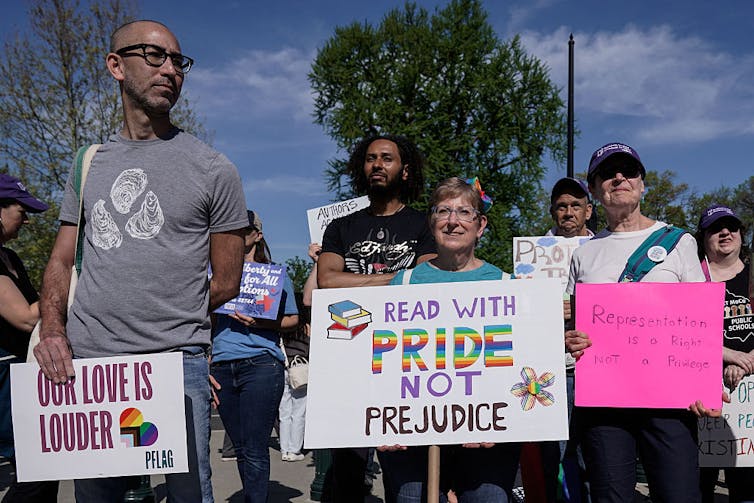In LGBTQ+ storybook case, Supreme Court handed a win to parental rights, raising tough questions for educators
- Written by Charles J. Russo, Joseph Panzer Chair in Education and Research Professor of Law, University of Dayton
 The parents who brought the case had requested that their children be excused when books with LGBTQ+ characters were used in class.SDI Productions/E+ via Getty Images
The parents who brought the case had requested that their children be excused when books with LGBTQ+ characters were used in class.SDI Productions/E+ via Getty ImagesThe Supreme Court tends to save its blockbuster orders for the last day of the term – and 2025 was no exception.
Among the important decisions handed down June 27, 2025, was Mahmoud v. Taylor – a case of particular interest to me, because I teach education law. Mahmoud, I believe, may become one of the court’s most consequential rulings on parental rights.
An interfaith coalition of Muslim, Orthodox Christian and Catholic parents in Montgomery County, Maryland – including Tamer Mahmoud, for whom the case is named – questioned the school board’s refusal to allow them to opt their young children out of lessons using picture books with LGBTQ+ characters. Ruling in favor of the parents, the court found that the board violated their First Amendment right to the free exercise of religion by requiring their children to sit through lessons with materials inconsistent with their faiths.
Case history
The parents in Mahmoud challenged the use of certain storybooks that the board had approved for use in preschool and elementary school. “Pride Puppy!” for example – a book the schools later removed – portrays a family whose pet gets lost at a LGBTQ+ Pride parade, with each page devoted to a letter of the alphabet. The book’s “search and find” list of words directs readers to look for terms in the pictures, including “(drag) queen” and “king,” “leather” and “lip ring.” Other materials included stories about same-sex marriage, a transgender child, and nonbinary bathroom signs.
Initially, school administrators agreed to allow opt-outs for students whose parents objected to the materials. A day later, however, educators changed their minds. School officials cited concerns about absenteeism, the feasibility of accommodating opt-out requests, and a desire to avoid stigmatizing LGBTQ+ students or families.
In August 2023, a federal trial court rejected the parents’ claim that officials had violated their fundamental due process right to direct the care, custody and education of their children. The following year, the U.S. Court of Appeals for the 4th Circuit affirmed in favor of the board, finding that officials did not violate the parents’ rights to the free exercise of their religious beliefs, as protected by the First Amendment.
 A group of parents in Montgomery County, Maryland, protest the lack of opt-outs on July 20, 2023.Celal Gunes/Anadolu Agency via Getty Images
A group of parents in Montgomery County, Maryland, protest the lack of opt-outs on July 20, 2023.Celal Gunes/Anadolu Agency via Getty ImagesOn appeal, a 6-3 Supreme Court reversed in favor of the parents. Justice Samuel Alito, who authored the court’s opinion, was joined by Chief Justice John Roberts, plus Justices Clarence Thomas, Neil Gorsuch, Brett Kavanaugh and Amy Coney Barrett.
Supreme Court
In brief, the court held that by denying the parental requests to opt their children out of instruction inconsistent with their beliefs, school officials violated their First Amendment right to the free exercise of religion.
Alito largely grounded the court’s rationale in a dispute from 1925, Pierce v. Society of Sisters of the Holy Name of Jesus and Mary, and even more heavily on 1972’s Wisconsin v. Yoder. Both cases recognize the primacy of parental rights to direct the education of their children. According to Pierce’s famous dictum, “the child is not the mere creature of the state; those who nurture him and direct his destiny have the right, coupled with the high duty, to recognize and prepare him for additional obligations.”
In Yoder, Amish parents – an Anabaptist Christian community that avoids using many modern technologies – objected to sending their children to school after eighth grade because this would have violated their religious beliefs. The justices unanimously agreed with the parents that their children received all of the education they needed in their communities. The justices added that requiring the children to attend high school would have violated the parents’ rights to direct their children’s religious upbringing.
Accordingly, the court acknowledged that the parental right “to guide the religious future and education of their children” was “established beyond debate.”
Similarly, in Mahmoud the court declared that “the Board’s introduction of the ‘LGBTQ+-inclusive’ storybooks, along with its decision to withhold opt-outs, places an unconstitutional burden on the parents’ rights to the free exercise of their religion.”
Thomas agreed fully with the court, yet wrote a separate concurrence, which emphasized “an important implication of this decision for schools across the country.” Citing Yoder, Thomas contended that rather than support inclusion, the board’s policy “imposes conformity with a view that undermines parents’ religious beliefs, and thus interferes with the parents’ right to ‘direct the religious upbringing of their children.’”
Justice Sonia Sotomayor’s dissent, joined by Justices Elena Kagan and Ketanji Brown Jackson, feared “the result will be chaos for this Nation’s public schools. Requiring schools to provide advance notice and the chance to opt out of every lesson plan or story time that might implicate a parent’s religious beliefs will impose impossible administrative burdens on schools.”
 Supporters of LGBTQ+ rights demonstrate outside the U.S. Supreme Court during oral arguments in Mahmoud v. Taylor on April 22, 2025.Oliver Contreras/AFP via Getty Images
Supporters of LGBTQ+ rights demonstrate outside the U.S. Supreme Court during oral arguments in Mahmoud v. Taylor on April 22, 2025.Oliver Contreras/AFP via Getty ImagesShe maintained that “simply being exposed to beliefs contrary to your own” does not violate a person’s free exercise rights. Insulating children from different ideas, she wrote, denies them of an experience that is crucial for democracy: “practice living in our multicultural society.”
Implications
After the decision was handed down, Montgomery County’s Board of Education issued a statement promising to “analyze the Supreme Court decision and develop next steps in alignment with today’s decision, and as importantly, our values.”
Mahmoud raises challenging questions about the scope or reach of how far parents can question curricular content.
On the one hand, parents should not be able to micromanage curricular content via the “heckler’s veto,” because this can lead to larger issues. Moreover, while Mahmoud concerns religious rights, what happens if parents question teachings based on another type of sincerely held belief – discussing war if they are pacifist, for example, or capitalism if they are socialists? While Mahmoud dealt with free-exercise rights, it may open the door to other types of First Amendment challenges from parents wishing to exempt their children from lessons.
On the other hand, Mahmoud highlights the need to take legitimate parental concerns into consideration. While educators typically control instruction, how can they be respectful of parents’ rights as primary caregivers of their children when conflicts arise?
Mahmoud may go a long way in defining parents’ free-exercise rights in public schools. Still, such disputes are likely far from over in America’s increasingly diverse religious culture.
Charles J. Russo does not work for, consult, own shares in or receive funding from any company or organization that would benefit from this article, and has disclosed no relevant affiliations beyond their academic appointment.
Authors: Charles J. Russo, Joseph Panzer Chair in Education and Research Professor of Law, University of Dayton

